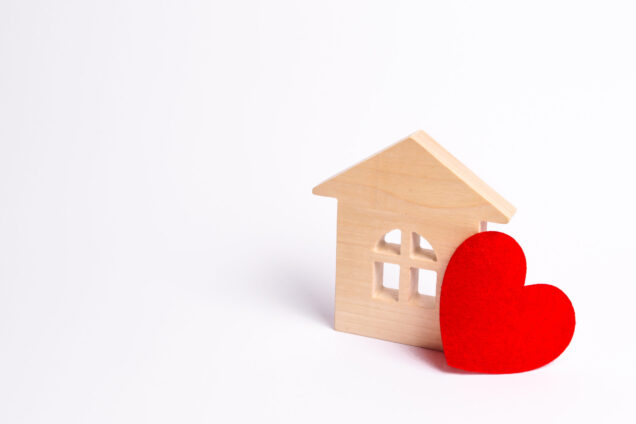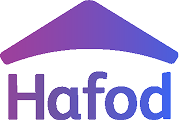Shared ownership is a part buy/part rent scheme which means you own a share in your home and pay rent on the remaining share which is owned by Hafod.
You own a share in your home on a long term lease. Your lease is a legal document that sets out details of your ownership of a share of your home and sets out the rights and responsibilities of you and Hafod. We will usually have a right to nominate a purchaser for the property if you wish to sell.
You will need a repayment mortgage to purchase the property and will need to make the agreed payments to the mortgage lender. You will also need to pay rent to us on the share that you do not own.
If you wish to repay Hafod’s equity share, remortgage or sell your home, you will need to contact us.

Find out more about shared ownership below
You may purchase our share or increase your share in the property at any time. We recommend that you regularly review your ownership of the property and take financial and legal advice on whether it would be in your best interests to purchase all or part of our share. When you are in a financial position to do so, it may be worthwhile taking financial and legal advice on purchasing our share or increase your share in the property but you will need to take your own advice on this.
Your option to increase your share in your property is via a process known as ‘staircasing’. The amount you can staircase will be specified in your lease. It is usually in multiples of 20% or 25%. If you wish you can purchase all of Hafod’s share thereby owning the property outright which is referred to as staircasing to 100%.
A valuation by an independent RICS qualified valuer will be required to establish the cost of purchasing a further share or staircasing to full ownership. The valuation will be based on the current market value of your home at the time you want to staircase. If you’ve carried out home improvements that we have approved and that have added value to your property, this added value will be disregarded in the valuation.
| Example – If the valuation of your property is £250,000 and Hafod’s share is 60% the amount payable to purchase an additional 20% would be £50,000. The amount payable to purchase Hafod’s full 60% share to staircase to full ownership would be £150,000. |
You will be responsible for paying the valuation fee together with your solicitor’s fees.
If your property is a house and you choose to staircase to 100%, the freehold of the house will be transferred to you. Following a transfer of the freehold, you will no longer be liable to pay rent to us. If you are living on a development with shared maintenance areas, you will still be required to pay an estate charge.
If your property is a flat and you choose to staircase to 100%, you will normally remain a leaseholder but you will own 100% of the leasehold interest. You will be responsible for paying ground rent (if applicable) and service charges. Ground rent is usually a low amount and will be much less than the rent you will have paid when you did not own 100%. Service charges usually cover the cost of maintaining the block, any common areas, etc. Full details will be set out in the lease.
Our right to nominate a purchaser for the property will usually be released when you purchase the property outright.
You can sell your home to at any time. You will need to contact us to deal with this. If you own less than 100% then under the terms of your lease we may have the right to nominate a person to buy your share. If we are not in a position to find a buyer, you can instruct an estate agent to sell in the normal manner. The purchaser would usually purchase the property outright. Your conveyancer dealing with the sale would usually liaise with us to deal with this.
As with staircasing, the value of your home will be assessed when you decide to sell and our share will be based on the market value at that time.
You will be responsible for paying the valuation fee together with your solicitor’s fees.
If you wish to change mortgage provider or wish to take out further loans for repairs or improvements which are to be secured on the home, you will need to request our consent before you take out the loan.
Hafod will not consent to a mortgage which will result in the total mortgages on the property being greater than the percentage of the property that you own e.g. if you own 40% of the property, the maximum mortgage(s) that you may take out will be 40% of the value of the property at the time that you wish to enter into the new mortgage.
We may require a valuation by an independent RICS qualified valuer if it is not clear from the information provided that the total mortgages are less than relevant percentage.
You will be responsible for the legal fees and administrative fees incurred by Hafod.
This depends on whether you bought your home alone or with others.
If you bought your home on your own and you die, the home will be passed on in the normal way under the terms of your will (if you have made one) or otherwise under the laws of intestacy.
If you bought your home with others and one of you dies, the interest in the property of the person who has passed away will either:
- be transferred to the surviving co-owner(s) (if you are joint tenants); or
- pass under the terms of their will (if they have made one) or otherwise under the laws of intestacy (if you are tenants in common).
If whoever inherits the property wishes to live there, they will need to be able to pay all outgoings including any private mortgage and they would need approval from the private mortgage lender as well as Hafod. Hafod would only usually approve this if it is a member of the home owner’s family or their partner who lived at the property prior to the death of the home owner.
If whoever inherits the property wishes to sell the property, the private mortgage and Hafod’s share of the property will need to be repaid as set out above.
It is recommended that owners seek independent legal advice about this. They will be able to advise if you are joint tenants or tenants in common and also on dealing with the property in these circumstances.
You are required to keep the property in good and substantial repair and condition. This is a requirement set out in the lease and it is also in your own interests.
If you buy a house, you will be responsible for all repairs needed to the property.
If you buy a flat or maisonette, you will be responsible for repairing the flat itself and will also have to contribute towards the upkeep of the building. The person who owns the block of flats (called the freeholder/ landlord) (or possibly a management company on their behalf) will be responsible for repairing and maintaining the outside of the building and any common parts. The costs of work will be listed in a service charge, which each flat owner has to contribute to. The terms of the lease will need to be reviewed to determine who is responsible for which repairs, how the service charge is to be dealt with, etc.
If you buy a house, you must obtain Hafod’s written consent before making any alterations or improvements to the property. The same will apply if you buy a flat or maisonette, but in addition you may need to obtain the consent of the freeholder, landlord, or management company.
You are required to pay rent to Hafod and this obligation will be set out in your lease. The rent will increase annually. The basis on which it will be increased will be set out in your lease.
We will insure your home in case your property is damaged or destroyed by fire or similar disaster (buildings insurance). Please see our insurance claims guide.
You may wish to insure your belongings and furniture (contents insurance).
You should take your own independent financial advice before making any commitment.
The funding for the purchase of properties under this scheme is so as to assist people to own a property. Therefore, you are required to occupy the property as your only or main residence. You are not permitted to sublet the property.
